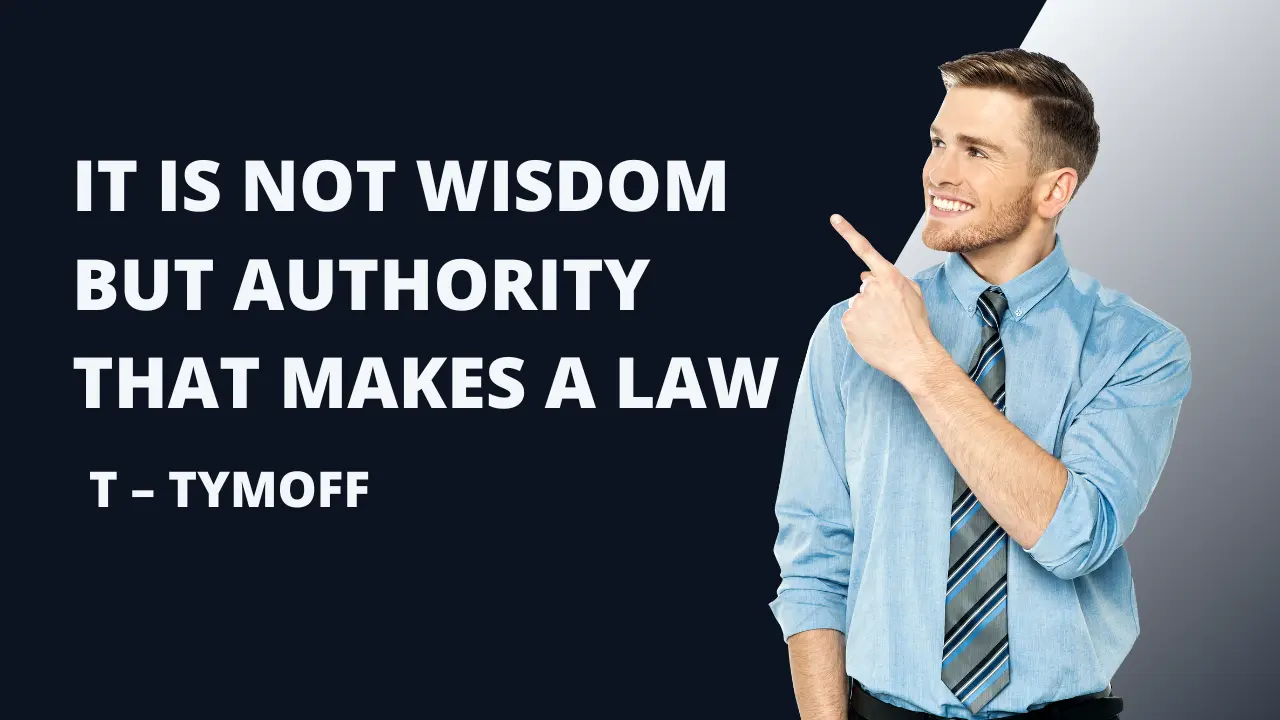In the intricate dance of lawmaking, the interplay between authority and wisdom shapes the fabric of governance and societal order. Embedded within the adage, It is Not Wisdom But Authority That Makes a Law. t – tymoff, lies a profound reflection on the nuanced relationship between institutional power and moral discernment. This article embarks on an extensive exploration of this dynamic, delving into its complexities and implications for the legal landscape.
Understanding It is Not Wisdom But Authority That Makes a Law. t – tymoff:
It is Not Wisdom But Authority That Makes a Law. t – tymoff serves as the bedrock of governance, vested in institutions and individuals tasked with crafting, interpreting, and enforcing laws. Anchored in constitutions, statutes, and social contracts, authority provides the structural scaffolding within which laws are formulated and implemented. From legislative bodies to executive agencies and judicial tribunals, authority permeates every facet of the legal system, wielding power derived from consent, tradition, or coercion. It acts as a bulwark against chaos and disorder, ensuring the stability and predictability of legal regimes.
The Essence of Wisdom:
Contrary to the institutional nature of authority, wisdom emanates from individual and collective insights, experiences, and moral discernment. It transcends formal structures, drawing upon diverse perspectives, cultural values, and ethical principles. Wisdom enriches the lawmaking process with depth, nuance, and moral clarity, guiding policymakers in crafting laws that resonate with the values and aspirations of society. It serves as a moral compass, tempering the exercise of authority with considerations of justice, fairness, and human dignity.
The Intersection of It is Not Wisdom But Authority That Makes a Law. t – tymoff:
At the nexus of It is Not Wisdom But Authority That Makes a Law. t – tymoff lies a complex interplay of interests, values, and ideologies. While authority provides the legal framework for governance, wisdom infuses laws with moral legitimacy and societal resonance. However, tensions may arise when authority supersedes wisdom, leading to laws lacking moral grounding or failing to address the nuanced complexities of human experience. Conversely, an overemphasis on wisdom at the expense of authority may result in paralysis or gridlock in the lawmaking process, hindering the enactment of necessary reforms.

Harmonizing Authority and Wisdom:
Achieving a harmonious balance between It is Not Wisdom But Authority That Makes a Law. t – tymoff is essential for fostering effective and equitable legal systems. Policymakers must integrate diverse perspectives, expert knowledge, and ethical considerations into the lawmaking process. This entails recognizing the inherent limitations of authority and embracing the insights offered by wisdom to craft laws that are not only authoritative but also wise. Mechanisms such as checks and balances, public consultation, and judicial review serve as safeguards against abuses of authority, ensuring that laws remain responsive to the evolving needs and values of society.
Challenges and Controversies:
The dominance of It is Not Wisdom But Authority That Makes a Law. t – tymoff in lawmaking can give rise to a host of challenges and controversies, particularly in cases where laws infringe upon fundamental rights or fail to uphold principles of justice and fairness. Debates surrounding contentious issues such as civil liberties, social justice, and environmental protection underscore the tensions inherent in the lawmaking process. Moreover, the interpretation and application of laws by judicial authorities may further complicate matters, highlighting the need for a delicate balance between legal formalism and substantive justice.
Striving for Equilibrium:
Striking a delicate balance between authority and wisdom requires a multifaceted approach that embraces both institutional power and moral insight. By fostering dialogue, collaboration, and inclusivity in the lawmaking process, societies can navigate the complexities of governance with integrity and transparency. Moreover, cultivating a culture of ethical leadership and civic engagement is essential for holding authorities accountable and ensuring that laws reflect the values and aspirations of the populace. In doing so, societies can forge legal frameworks that are not only authoritative but also wise, embodying the principles of justice, equality, and human dignity.
It is Not Wisdom But Authority That Makes a Law. t – tymoff: Conclusion
It is Not Wisdom But Authority That Makes a Law. t – tymoff as we navigate the ever-evolving landscape of law and governance, it is imperative to recognize the indispensable role of both authority and wisdom in shaping our legal systems. By harmonizing these elements with integrity and foresight, societies can foster a culture of effective and equitable governance that upholds the principles of justice, fairness, and human dignity. In embracing the synergy between institutional power and moral insight, we can pave the way towards a more just, compassionate, and resilient future for all.
Frequently Asked Questions (FAQs) about It is Not Wisdom But Authority That Makes a Law. t – tymoff
Q1: what you mean by It is Not Wisdom But Authority That Makes a Law. t – tymoff?
It is Not Wisdom But Authority That Makes a Law. t – tymoff shapes laws by providing the legal framework and institutional power for governance. It’s vested in legislative bodies, executive agencies, and judicial institutions, guiding the crafting, interpretation, and enforcement of laws.
Q2: What role does It is Not Wisdom But Authority That Makes a Law. t – tymoff play in lawmaking?
A2: It is Not Wisdom But Authority That Makes a Law. t – tymoff plays a pivotal role in lawmaking by providing the legal framework and institutional power necessary for governance, guiding the crafting, interpretation, and enforcement of laws.
Q3: What challenges arise when authority supersedes wisdom in lawmaking?
A3: When authority dominates over wisdom, laws may lack moral grounding or fail to address the nuanced complexities of human experience. This can lead to tensions, controversies, and challenges, particularly in cases where laws infringe upon fundamental rights or fail to uphold principles of justice and fairness.
Q4: How can policymakers achieve a harmonious balance between authority and wisdom?
A4: Policymakers can integrate diverse perspectives, expert knowledge, and ethical considerations into the lawmaking process. Mechanisms such as checks and balances, public consultation, and judicial review serve as safeguards against abuses of authority and ensure that laws remain responsive to the evolving needs and values of society.
Q5: What are some examples of controversies arising from the dominance of authority in lawmaking?
A5: Controversies may arise in cases where laws infringe upon civil liberties, social justice, or environmental protection. Debates surrounding contentious issues underscore the tensions inherent in the lawmaking process and highlight the importance of balancing institutional power with moral insight.
Q6: How can societies foster effective and equitable governance while embracing both authority and wisdom?
A6: By fostering dialogue, collaboration, and inclusivity in the lawmaking process, societies can navigate the complexities of governance with integrity and transparency. Cultivating a culture of ethical leadership and civic engagement is essential for holding authorities accountable and ensuring that laws reflect the values and aspirations of the populace.
Q7: What are some strategies for holding authorities accountable in the lawmaking process?
A7: Strategies for holding authorities accountable include mechanisms such as transparency, oversight, and public participation. By promoting transparency in decision-making processes, establishing independent oversight bodies, and encouraging active civic engagement, societies can ensure that authorities remain accountable to the people they serve.
Q8: How do legal systems balance legal formalism with substantive justice?
A8: Legal systems balance legal formalism, which emphasizes adherence to legal rules and procedures, with substantive justice, which focuses on achieving fair and just outcomes. Judicial authorities play a crucial role in interpreting and applying laws in a manner that upholds both legal formalism and substantive justice.
Q9: What are some key principles underlying effective lawmaking?
A9: Effective lawmaking is guided by principles such as transparency, accountability, inclusivity, and responsiveness. By upholding these principles, policymakers can ensure that laws reflect the diverse needs and values of society while promoting integrity and legitimacy in the lawmaking process.
Q10: How can individuals contribute to shaping effective and equitable legal frameworks?
A10: Individuals can contribute to shaping effective and equitable legal frameworks by actively participating in civic life, advocating for meaningful reforms, and holding authorities accountable. By engaging in dialogue, collaboration, and advocacy, individuals can help shape laws that promote justice, equality, and human dignity for all members of society.

Navigating the Diverse Realms of Tech, News, and Business
Meet Debra Evans, a versatile blogger with a passion for exploring the ever-evolving landscapes of technology, news, business, and more. Debra’s blogs are a reflection of her commitment to delivering insightful content that spans a spectrum of niches. With a knack for distilling complex topics into digestible insights, Debra invites readers to join her on a journey where each blog post is a window into the dynamic intersection of modern trends and business dynamics.
